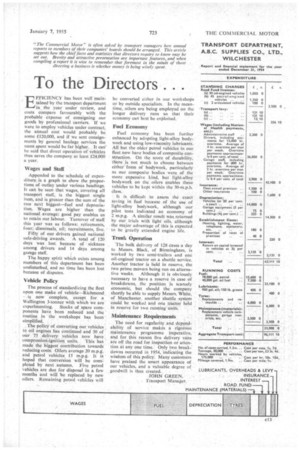To the Directors
Page 53

If you've noticed an error in this article please click here to report it so we can fix it.
EFFICIENCY has been well maintained by the transport department in the year under review, and costs compare favourably with the probable expense of consigning our goods by professional carriers. If we were to employ vehicles under contract, the annual cost would probably be some £120,000, and if we sent consignments by general haulage services the sums spent would be far higher. It can be said that direct operation of vehicles thus saves the company at least £24,000 a year.
Wages and Staff
Appended to the schedule of expenditure is a graph to show the proportions of outlay under various headings. li can be seen that wages, covering all transport staff, is the biggest single item, and is greater than the sum of the two next biggest—fuel and depreciation. Wages are higher than the national average: good pay enables us to retain our labour. Turnover of staff this year was as follows: retirements, four; dismissals, nil; recruitments, five. • Fifty of our drivers gained national safe-driving awards. A total of 120 days was lost because of sickness among drivers and 14 days among garage staff.
The happy spirit which exists among members of this department has been undisturbed, and no time has been lost because of disputes. •
Vehicle Policy
The process of standardizing the fleet upon one make of vehicle---Richmond ---is now complete, except for a Wellington 3-tonner with which we are experimenting. Stocks of spare components have been reduced and the routine in the workshops has been simplified.
The policy of converting our vehicles to oil engines has continued and 30 of our 75 delivery vehicles now have compression-ignition units. This has made the biggest contribution towards reducing costs. Oilers average 20 m.p.g. and petrol vehicles 15 m.p.g. It is hoped that conversion will be com. pIeted by next autumn. Five petrol vehicles are due for disposal in a few months and will be replaced by new oilers. Remaining petrol vehicles will be converted either in our workshops or by outside specialists. In the meantime, oilers are being employed on the longer delivery runs so that their economy can best be exploited.
Fuel Economy
Fuel economy has been further enhanced by adopting light-alloy bodywork and using low-viscosity lubricants. All but the older petrol vehicles in ourfleet now have bodies of composite construction. On the score of durability, there is not much to choose between either form of bodywork, particularly as our composite bodies were of the more expensive kind, but light-alloy bodywork on the oilers enables these vehicles to be kept within the 30-m.p.h. Class.
It is difficult to assess the exact saving in fuel because of the use of light-alloy bodywork, although our pilot tests indicated an economy of 2 m.p.g. A similar result was returned by our trials with light oils, although the major advantage of this is expected to be greatly extended engine life.
Trunk Operation The bulk delivery of 128 cases a day to Messrs. Black, of Birmingham, is worked by two semi-trailers and one oil-engined tractor on a shuttle service. Another tractor is held in reserve, the two prime movers being run on alternative weeks. Although it is obviously necessary to have a reserve in case of breakdowns, the position is scarcely economic, but should the company shortly be able to supply Messrs. White, of Manchester, another shuttle system could be worked and one tractor held in reserve for two running units.
Maintenance Requirements The need for regularity and dependability of service makes a rigorous maintenance programme imperative, and for this reason five delivery vans are off the road for inspection or attention at any one time. Only two breakdowns occurred in 1954, indicating the wisdom of this policy. Many customers have praised the smart appearance of our vehicles, and a valuable degree of _goodwill is thus created.
JOHN GREEN, Transport Manager.
















































































































